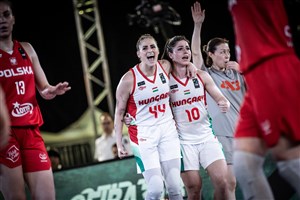
USA - Empowering women programme takes 24 girls to NCAA Final Four
NASHVILLE - There was joy for 24 young women from around the globe recently after they engaged in the U.S. Department of State's NCAA Women's Final Four Basketball Programme.
Created to encourage the successful fusion of sports, peace and development in the creation of opportunities for women and girls, both in America and around the world, the participants enjoyed a two-week exchange programme in Tennessee.
The highlight for those lucky enough to take part was attendance at the Women's Final Four Championship in Nashville, although the delegation also remained focused on promoting the UN's International Day of Sport for Development and Peace.
This special inaugural event on 6 April perfectly synced with the midpoint of what is being deemed a flagship multi-nation exchange programme, facilitated by the Bureau of Educational and Cultural Affairs' Empowering Women and Girls through Sports Initiative.
The girls created posters to represent the importance of sports and peace in their own countries and engaged in dialogue on what they will do back home to encourage others to get along through sports.
Although the teenagers came from nations spread right across the globe including Argentina, Kyrgyzstan, Lebanon, Nigeria, South Korea and Turkey, they were united in their shared passion for basketball and desire to use basketball for peaceful social change, women's empowerment and, in turn, further development back home.
The attendees also visited the University of Tennessee, Knoxville who are a partner of the initiative. There was a visit on site by U.S. Department of State Senior Advisor, Michelle Kwan - a five-time World Figure Skating Champion and two-time Olympic medallist.
She delivered remarks on the State Department's use of sports to build bridges between people from different nations so that everyone can address global challenges and seek peaceful resolutions together.
In a panel discussion following her address, the six international coaches who were present were asked to describe the challenges facing women and particularly female athletes in their home countries.
Aigul Kzhaparova of Kyrgyzstan explained: "Not a lot of girls play basketball in Kyrgyzstan because they traditionally do other things. We also don't have many basketball courts."
Meanwhile, Hae Young Kim of Korea said: "When Korea started to pay attention to the big sporting events like the World Cup and Olympics, it became more culturally acceptable for females to participate in sport.
"But many times, if a young women wants to play basketball or a sport, the general perception is that she should be professional or an Olympian."
FIBA

















